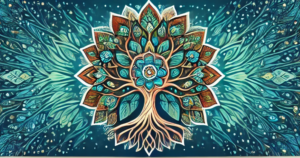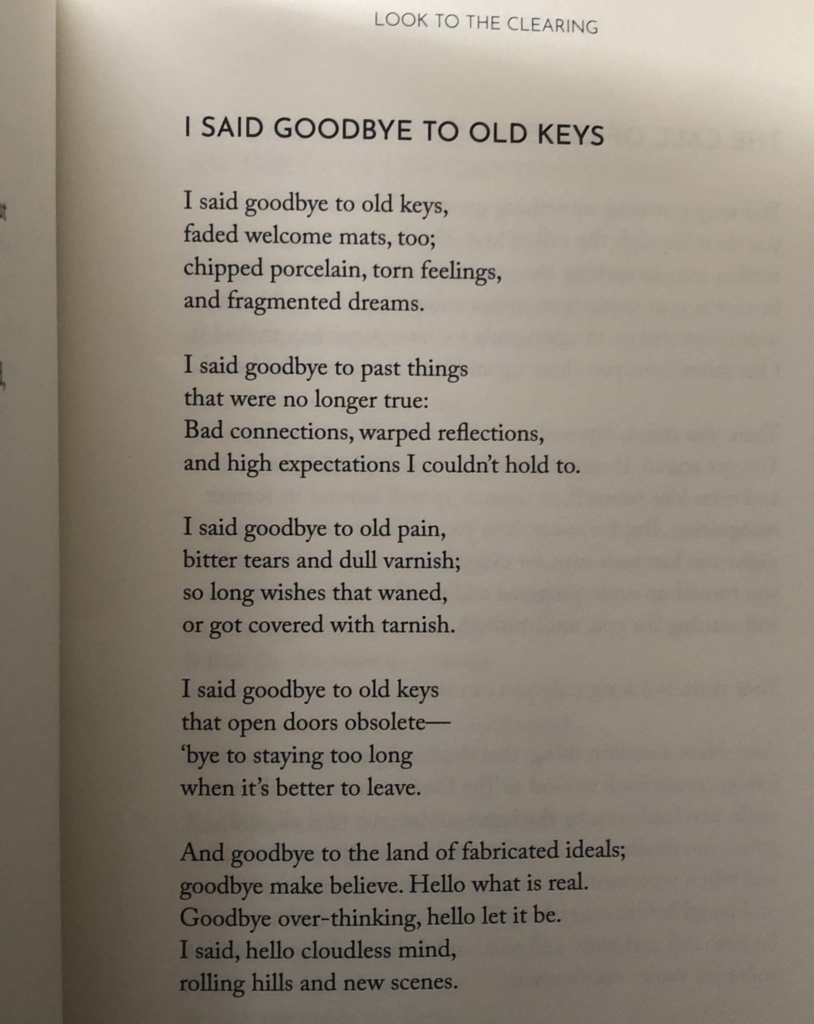The Symbolism of Keys
… and How They Can Instruct Us in Letting Go
Keys are a common symbolic component when it comes to soul work, but as I write this on March 4, 2023, keys have taken on a major focus. Yesterday, on the 3/3 portal, my mom texted me to ask if I had a key to her house. I said no and asked if she was locked out. She said no, she had just decided to organize the keys in her house. Unfortunately, she couldn’t locate her house key, and she had a pile of unknown keys still sitting on her dining room table. “I hate to throw them out,” she said. “I know as soon as I do, I’ll surely come across whatever lock they go with.”
This morning, while checking social media messages, Susan Frybort’s poem, “I Said Goodbye to Old Keys,” caught my attention (see below). Not only was my mom dealing with her own keys and the angst of parting with orphaned keys, but I had also received a message, or download if you prefer, that it is imperative that we start finalizing ourselves for ascension. Letting go of anything that isn’t supportive of our continued journey is particularly important. Thus Frybort’s poem caught my attention in two major ways: 1.) the theme of keys, and 2.) the need to let go. If you were climbing Mount Everest, for instance, would you want a well-supplied but minimalist pack to carry, or heavy bags full of useless junk? Alternatively, the image I was shown was that of someone running to board a plane. The gate is closing, will you make it? If you’re packed concisely, yet, but if you have a line of 50 bags crazily bumping along behind you, no.
Let’s first discuss keys as an important symbolic element on the spiritual journey. In my work with clients, it’s rare to not have keys come up, whether it’s in a QHHT® or shamanic journeying, or other. Very often, clients are given or shown keys during the course of our work together. So let’s take a deeper look at the archetypal key before diving into their particular current significance now.
Keys have been an important symbol in various cultures and mythologies throughout history. They are often associated with unlocking and revealing hidden truths or treasures, and can represent power, authority, and knowledge.
The Symbolism of Keys in Mythology and Legend
In many cultures, keys are symbols of power and authority. In ancient Egypt, the god Horus was often depicted holding a key, which symbolized his power to unlock the gates of heaven. In Greek mythology, Hermes, the messenger of the gods, was often depicted with a key, which represented his ability to travel freely between the world of the living and the world of the dead. In Hinduism, the god Vishnu was often depicted holding a key, which symbolized his power to unlock the gates of heaven and bring salvation to his followers.
In medieval Europe, keys were often associated with the Christian church. Keys were a symbol of St. Peter, the gatekeeper of heaven, and were often used to depict him in Christian art. In the Middle Ages, keys were also used as a symbol of the power of the monarchy. Kings and queens would often carry ceremonial keys as a sign of their authority and power.
The Symbolism of Keys in Psychology
In psychology, keys have been interpreted as symbols of unlocking hidden truths or repressed emotions. Carl Jung, the Swiss psychologist, believed that keys represented access to the unconscious mind. In his book “Man and His Symbols,” Jung wrote that keys “open doors that are closed to the rational mind and reveal the hidden secrets of the psyche.” Jung believed that keys represented the power to unlock the unconscious mind and bring hidden knowledge to the conscious mind.
Sigmund Freud, the Austrian psychoanalyst, also saw keys as symbols of unlocking hidden desires and emotions. In his book “The Interpretation of Dreams,” Freud wrote that keys were often used in dreams as symbols of sexual desire. According to Freud, keys represented the power to unlock the sexual desires that were hidden in the unconscious mind.
The Symbolism of Keys in Literature
Keys have played an important role in literature, often symbolizing access to hidden knowledge or secrets. In Nathaniel Hawthorne’s “The Scarlet Letter,” the main character, Hester Prynne, wears a key around her neck that represents her secret knowledge of the identity of the father of her child. In Emily Bronte’s “Wuthering Heights,” the character of Lockwood finds a key that unlocks the secret room where the tragic love story of Catherine and Heathcliff is revealed.
Keys are also an important symbol in the Harry Potter series by J.K. Rowling. The main character, Harry Potter, must find and unlock hidden doors and rooms in order to uncover the secrets of the wizarding world.
Keys have been an important symbol in various cultures and mythologies throughout history. They are often associated with unlocking hidden knowledge or secrets, and can represent power, authority, and access to the unconscious mind. The symbolism of keys has been explored in psychology by Carl Jung and Sigmund Freud, as well as in literature and art.
“I Said Goodby to Old Keys”
Susan Frybort’s poem “Saying goodbye to Old Keys” is a beautiful and evocative piece that speaks to the importance of letting go of what no longer serves us. Through her words, she reminds us that we must make space in our lives for new opportunities and growth.
We all have things in our lives that we cling to, whether they be physical possessions, relationships, or even beliefs that no longer serve us. Letting go of these things can be incredibly difficult, but it’s a necessary part of personal growth and spiritual ascension. In fact, the symbolism of keys can provide a powerful reminder of this truth.
Think about it: keys are used to unlock doors, to gain access to new places and experiences. But if you’re holding onto a key that no longer unlocks anything, it becomes nothing more than a meaningless piece of metal. And if you’re carrying around a bunch of keys that you haven’t used in years, they’re just taking up space in your life and preventing you from moving forward.
In the same way, holding onto things that no longer serve us can hold us back from reaching our full potential. We may feel a sense of comfort or familiarity with these things, but ultimately they’re just cluttering our lives and preventing us from experiencing new opportunities and growth.
Of course, it’s not always easy to let go. We may feel a sense of attachment or nostalgia towards certain possessions or people, even if they’re not serving us in the present moment. But it’s important to remember that by letting go, we’re creating space for something new and potentially even better to come into our lives.
So, if you find yourself holding onto things that no longer serve you, try to channel the symbolism of keys. Imagine yourself unlocking a new door, walking through it with confidence and excitement. Focus on the potential that comes with letting go, rather than the fear or discomfort.
And if you’re still struggling, remind yourself that you’re not alone. Many people struggle with letting go, whether it be due to emotional, mental, or spiritual reasons. But by acknowledging the need for change and taking small steps towards letting go, you can start to create a more fulfilling and purposeful life.
Remember, letting go doesn’t have to be a daunting or overwhelming process. Start small, whether it be by decluttering your living space or saying goodbye to toxic relationships. The more you practice letting go, the easier it will become, and the more you’ll start to unlock the doors to new experiences and opportunities in your life.
Meditation
If you’re someone who is sorting through old keys and trying to determine which ones still serve a purpose in your life, there’s a simple meditation you can practice to help you tap into your intuition and connect with your soul.
Start by finding a quiet, peaceful space where you won’t be interrupted. Sit or lie down in a comfortable position, and take a few deep breaths to center yourself and calm your mind.
Now, take a look at each of your old keys, one by one. Hold them in your hand, and examine them closely. Notice any emotions or feelings that come up as you hold each key. Do you feel a sense of attachment or nostalgia? Or do you feel a sense of apathy or disinterest?
As you hold each key, ask yourself if it still serves a purpose in your life. Does it unlock something that is important to you? Or is it simply taking up space and preventing you from moving forward?
If a key no longer serves a purpose, set it aside with gratitude for the role it played in your life. You can even thank the key for its service and wish it well on its journey.
As you examine each key, allow yourself to connect with your intuition and your soul. Imagine that each key represents a different aspect of your being, and that by examining them, you’re gaining a deeper understanding of yourself.
Now, imagine that you’re searching for the key to your soul. This key represents all of the gifts and potential that you possess, and it’s the key that unlocks the door to your truest, most authentic self.
Take a moment to visualize this key in your mind’s eye. What does it look like? How does it feel in your hand? Trust that this key exists within you, and that you have the power to access it at any time.
As you continue to sort through your old keys, keep this image of the key to your soul in mind. Remember that letting go of the old and unnecessary keys in your life is a necessary step towards unlocking the door to your true potential.
When you’ve finished examining your keys, take a few deep breaths and give yourself a moment of gratitude for taking the time to connect with your intuition and your soul. Trust that you’re on the right path, and that by letting go of what no longer serves you, you’re creating space for all of the wonderful things that are yet to come.
References:
Jung, C. G. (1964). Man and his symbols. Anchor Books.
Freud, S. (1913). The interpretation of dreams. Basic Books.
“Keys in mythology and legend.” Encyclopedia Britannica. https://www.britannica.com/topic/key-symbolism.
Frybort, S. (n.d.). Saying goodbye to Old Keys. Open Passages. Retrieved from https://www.susanfrybort.com/.
Schedule a Session With Me
If you’d like to go deeper in a supportive, healing environment, please visit my scheduling page.



